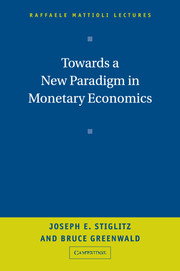Book contents
- Frontmatter
- Contents
- List of figures and table
- The Raffaele Mattioli Lectures
- Preface
- Part I The principles of the new paradigm
- 1 Reflections on the current state of monetary economics
- 2 How finance differs
- 3 The ideal banking system
- 4 Restricted banking (or, the banking system of today)
- 5 Market equilibrium
- 6 From the corn economy to the monetary economy
- 7 Towards a general equilibrium theory of credit
- Part II Applications of the new paradigm
- Bibliography
- Index
1 - Reflections on the current state of monetary economics
Published online by Cambridge University Press: 12 May 2010
- Frontmatter
- Contents
- List of figures and table
- The Raffaele Mattioli Lectures
- Preface
- Part I The principles of the new paradigm
- 1 Reflections on the current state of monetary economics
- 2 How finance differs
- 3 The ideal banking system
- 4 Restricted banking (or, the banking system of today)
- 5 Market equilibrium
- 6 From the corn economy to the monetary economy
- 7 Towards a general equilibrium theory of credit
- Part II Applications of the new paradigm
- Bibliography
- Index
Summary
To theorists, monetary economics has long presented a challenge: finding the assumptions under which it does or does not matter. The challenge is all the greater because, while it is easy to construct models in which money matters, it is hard to believe that the quantitative effects in at least many of these are significant enough to account for observed behavior. For instance, macro–economists have often relied on the real balance effect, the fact that as prices fall, the real value of money increases, making individuals feel better off. However, for moderate rates of decline in prices, the magnitude of the real balance effect is too small to account, for instance, for an economic recovery.
A second example concerns the refutation of the monetarist doctrine that prices move proportionally to increases in the money supply, for any monetary regime, so that there are no real effects of the increase in the money supply. Assume that were the case. Define a monetary regime as a rule of monetary expansion, depending on the state of nature, such that the expected rate of change of the money supply E[d\nM/dt] is a constant; the expected return to holding money is the same among monetary regimes given that prices move proportionally to M. However, if individuals are risk averse, then changes in the monetary regime will affect the probability distribution of returns, and hence, in general, the relative demand for money and capital, and therefore will have real effects, counter to the assumption.
- Type
- Chapter
- Information
- Towards a New Paradigm in Monetary Economics , pp. 7 - 25Publisher: Cambridge University PressPrint publication year: 2003



